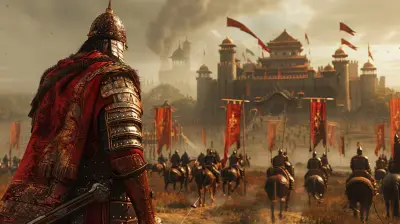How Season Passes Revolutionized Modern Gaming
16 April 2025
Back in the simpler days of gaming, we bought a game, played it, and that was it. No strings attached, no extended content, no "extras" teasing you from behind a digital storefront. But things have changed. Fast forward to today, and season passes have swooped in like plot twists in your favorite RPG, completely transforming the gaming landscape. Love them or hate them, season passes have become a massive part of modern gaming.
But how did we get here? Why do developers and publishers swear by them? And more importantly, what do they mean for us, the players stepping into these virtual worlds? Let’s dive deep into the mechanics of this gaming revolution.
What Are Season Passes Anyway?
Okay, quick rewind for anyone new to the term. Imagine your favorite game as a party. The base game? That’s your invitation. But the season pass? That’s the VIP wristband that opens the doors to extra rooms, exclusive cocktails, and a killer DJ set. In more practical terms, a season pass is a prepaid access to a game's post-launch content. Think new maps, characters, quests, cosmetics, and sometimes entire story expansions.Unlike DLCs (downloadable content) that often stand alone, season passes bundle future content into one package, promising more bang for your buck… or so they claim.
A New Era of Gaming: The Birth of Season Passes
The concept of season passes first popped up in the early 2010s. Back then, it was like an experiment in a science lab—developers were testing the waters. The pioneers? Games like Call of Duty: Black Ops 2 and Borderlands 2. These titles introduced the idea of paying upfront for upcoming content.Why did this idea stick? It made sense financially. Instead of convincing players to buy each DLC one at a time, publishers bundled them up with a season pass. It was a win-win on paper: players saved money (compared to buying DLC individually), and developers secured long-term commitment from their audience.
A Double-Edged Sword: Gamers’ Mixed Feelings
But hold on, not everyone was throwing confetti. For some, season passes felt like a golden ticket to additional adventures. For others? It was like being served half a pizza and told to pay extra for the toppings.Here’s the kicker: season passes introduced a new paradox in gaming. On one hand, it was awesome to know that your favorite game had a future—it wasn’t going to gather dust after a couple of months. But on the flip side, some players felt like developers were cutting content from the base game to sell it later. That’s a tough pill to swallow, right?
How Season Passes Became an Industry Standard
Over the years, season passes evolved from a novelty into a staple of gaming. They’re now as common as NPCs handing out quests. Why? Let me break it down:1. The Extended Lifespan of Games
Season passes gave developers a way to keep their games alive long after launch. Remember when games would peak at release and slowly fade away? Not anymore. With scheduled drops of new content, games now have longer lifespans. Players stick around, communities grow, and everyone keeps talking about the game.Take Destiny 2, for example. Its seasonal content keeps players grinding, raiding, and diving into new storylines years after its launch. What’s the secret sauce? A perfectly planned season pass system.
2. Predictable Revenue Streams
Gone are the days when developers relied solely on launch day sales. Season passes give publishers a safety net—a predictable stream of income post-launch to fund future projects and updates. In an industry as unpredictable as gaming, this financial stability is huge.3. The FOMO Effect
Let’s be real for a second. If there’s one thing season passes are great at, it’s triggering our Fear of Missing Out (FOMO). Limited-time rewards, exclusive skins, and tantalizing extras that you can only get with the pass? Yeah, it’s a genius marketing strategy. They know how to tap into our gamer hearts.The Good, The Bad, and the Pricey
Not all season passes are created equal. Some feel like discovering hidden treasure, while others? A suspicious loot box. Let’s unpack the highs and lows.The Bright Side
+ Affordable Bundles: A season pass often costs less than buying each piece of content separately. Win for the wallet.+ Content That Lasts: Players get new experiences without developers having to make entirely new games. Prolonged adventures? Yes, please.
+ Community Engagement: Seasonal updates keep the community buzzing and chatting, especially in multiplayer titles.
The Shady Side
+ Locked Content Debate: Are we paying for extra content or stuff that should’ve been in the base game? Hmm.+ The Commitment Problem: What if the content ends up being underwhelming? Buying a season pass is like betting on a mystery box.
+ Pricey Trends: Over time, some season passes started creeping toward higher price points, rivaling the actual game cost. Yikes.

The Rise of the Battle Pass System
Speaking of evolution, season passes have inspired a close cousin: the battle pass. Popularized by games like Fortnite and Apex Legends, the battle pass brings a more interactive twist. Instead of buying content upfront, players unlock rewards as they progress through challenges or level up during a particular season.It’s like gamifying the process of earning extra gear. With this pay-as-you-play model, players only get as much as they put in. It’s fairer in some ways but just as effective at keeping players hooked.
The Future of Season Passes
So, what’s next? Are season passes here to stay, or will they fade into pixels like unused save files? Looking ahead, it seems like they’re not going anywhere. But they’re evolving.We’re seeing more transparency from developers. They’re outlining exactly what you’ll get before you buy a season pass (thank you!). Plus, many games are experimenting with free seasonal updates combined with optional paid content.
On the flip side, with the rise of subscription services like Xbox Game Pass and PlayStation Plus, we might see a shift away from traditional season passes. After all, why buy extra content when you can have access to hundreds of games for a single monthly fee?
Conclusion: A Love-Hate Relationship
Season passes have undeniably revolutionized modern gaming. They’ve given us richer experiences, extended our favorite games’ lifespans, and kept developers financially afloat. But for all the good, there’s no denying the lingering questions about value, fairness, and whether we’re paying for things we once got for free.At the end of the day, season passes are like DLC’s cooler, trendier sibling. They’ve changed the rules of the game—for better or worse, depending on where you stand. And just like every plot twist, they’ve left gamers debating, discussing, and sometimes ranting about their place in the industry.
But one thing’s for sure: they’ve made their mark, and they’re not fading away anytime soon.
all images in this post were generated using AI tools
Category:
Season PassesAuthor:

Francesca West
Discussion
rate this article
6 comments
Zephyris McFarlin
Season passes transformed gaming into a dynamic, evolving experience. They offer players consistent content and developers a reliable revenue stream. Embrace the change—gaming has leveled up, and so should we!
May 2, 2025 at 3:21 PM

Francesca West
Absolutely! Season passes have indeed reshaped the gaming landscape by providing ongoing content and steady income, fostering a more engaging experience for both players and developers. Embracing this shift is essential for the future of gaming.
Gemma McKittrick
While season passes offer ongoing content and engagement, they often prioritize profit over player experience. This model can fragment gaming communities and create a cycle of dependency on continuous purchases, raising concerns about accessibility.
April 26, 2025 at 4:34 AM

Francesca West
Thank you for your comment! While season passes do enhance ongoing engagement, I acknowledge the concerns about profit prioritization and community fragmentation. Balancing monetization with player experience is crucial for the future of gaming.
Myles McDougal
While season passes offer players extended content and a streamlined experience, they can also lead to a reliance on microtransactions, sometimes overshadowing traditional game value. It's a double-edged sword that can benefit both players and developers, depending on implementation. Balance is key.
April 25, 2025 at 4:35 AM

Francesca West
I appreciate your insight! Indeed, the balance between extended content and the pitfalls of microtransactions is crucial for enhancing the gaming experience without compromising value.
Felicity Wilson
Fascinating perspective on season passes! It’s intriguing how they’ve reshaped player engagement and game development. I’m curious about the long-term effects on game quality and player satisfaction. Do you think they enhance the experience or risk oversaturation in the gaming landscape? Looking forward to more insights!
April 22, 2025 at 2:56 PM

Francesca West
Thank you for your thoughtful comment! Season passes can enhance player engagement and provide ongoing content, but they do risk oversaturation if not implemented thoughtfully. Striking the right balance is key to maintaining game quality and player satisfaction.
Alessia West
Season passes have transformed gaming by offering ongoing content and value, enhancing player engagement and ensuring sustained revenue for developers.
April 18, 2025 at 3:01 PM

Francesca West
Thank you for your insight! Season passes indeed create a win-win scenario, enriching player experiences while providing developers with consistent revenue streams.
Ryder Chapman
Season passes have transformed gaming into an ever-evolving narrative, fostering community engagement and continuous content delivery. However, they also raise questions about accessibility and the true value of experiences locked behind paywalls, challenging the essence of gaming as an inclusive medium.
April 16, 2025 at 3:31 PM

Francesca West
Thank you for your insightful comment! You raise important points about the balance between community engagement and accessibility in gaming. Season passes indeed create dynamic experiences, but it's crucial to ensure inclusivity remains a priority in our evolving landscape.




